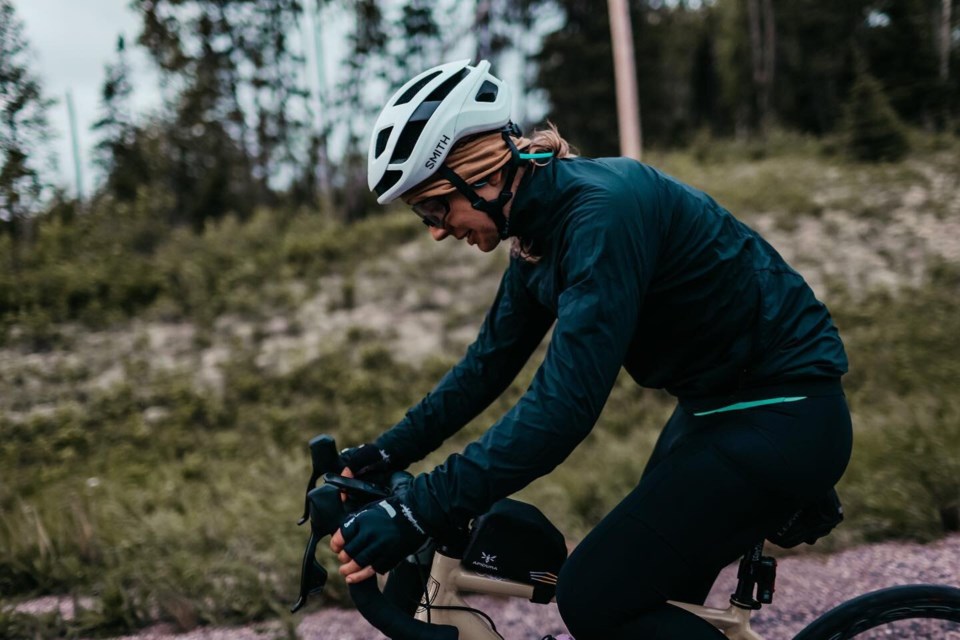After riding across Canada for almost two weeks straight, a North Vancouver ovarian cancer advocate had her Guinness World Record try cut short as an accident in Quebec left her with a concussion and ankle injury.
Bianca Hayes had been cycling almost 20 hours a day during her world record try, leaving Vancouver City Hall on June 13. Taking a short break every four hours and only sleeping two to three hours a night, Hayes rode thousands of kilometres eastward before the unfortunate turn of events lead to the mission being called off.
“We [were] getting to the really exciting part … the last 48-hour push, which was great, and it got cut short a little suddenly, unfortunately,” Hayes told the North Shore News. “But I'm really proud of everything that we did. … It was very exciting and a massive achievement up until the accident, but I'm just feeling very lucky.”
Hayes, no stranger to long rides, has been raising money and awareness about ovarian cancer since losing her sister to the disease in 2018. Taking part in the annual Ride to Conquer Cancer just a few months after Katrina’s death, Hayes rode to San Francisco in nine days the following year.
Trying to bring international attention to the disease, Hayes set out on her first Trans-Canada ride, becoming the fastest woman to bike across Canada in 2020. This year, Hayes was trying to raise $1 million for ovarian cancer and set the Guinness World Record for fastest Trans-Canada ride.
Posting to Instagram on Day 13 of her ride, Hayes told followers that she was involved in an accident with a motorcycle near Quebec City, Que., and ended up in hospital following her injuries.
“I'm still a little slower than normal. But it could have been a lot worse. [There are cyclists that] weren't so lucky. There was a recent accident in downtown Vancouver just a few days ago, so it puts it all into rather harsh perspective,” she said.
Sending an email to her helmet manufacturer, Smith, Hayes said she is very lucky and very happy her concussion isn’t worse.
“I think the technology that they have in helmets nowadays, MIPS -- the inner movement that they put in -- all the different parts of that helmet really came together and saved my brain,” she said.
Even though her world record try was cut short, Hayes said the ride was always about raising money.
“It was always for ovarian cancer. It was to raise money and raise awareness. … The world record was something I wanted, but the more important thing to me was raising awareness and money.”
As of publication, Hayes’ and her team have raised over $120,000 for ovarian cancer research at the 小蓝视频 Cancer Foundation and Ovarian Cancer Canada.
“Today, thousands of Canadian women are living with ovarian cancer and another 3,100 will be diagnosed this year,” Hayes writes.
“I am riding so that the women who hear this story know the following: our pap tests do not test for ovarian cancer; we do not currently have a screening test; and that every [person] with ovaries is at risk. I will stop at nothing to see this through.”
Unsure if she’ll try the feat again, Hayes isn’t ready to say “never” to riding across the country once more.
“Apparently, it was just a bad year, but I had a bad year the last time I did it, as well,” she said. “Typically winds go from west to east, but each time I've done this ride, I've had headwinds and they've been pretty awful.
“The fire is still there. I'm definitely frustrated about the result. As an athlete, it’s hard to walk away from something like that. … it's still going to be something that eats at me, it's still going to be there. So, I'd love to say never again, but I think I'd end up eating those words, to be honest with you” Hayes said laughing.
Hayes said that without her support team and sponsors, the ride wouldn’t have been possible. Finding community in fellow cyclists has helped boost the fundraiser immensely.
“There was always a great risk involved with a challenge of this magnitude. While it’s devastating that the world record won’t be set, we’re not going to stop chasing the greater goal: to raise awareness for ovarian cancer,” Hayes wrote on Instagram.
More information about Hayes’ work can be , while donations for ovarian cancer research can be made at her .
Charlie Carey is the North Shore News' Indigenous and civic affairs reporter. This reporting beat is made possible by the .


